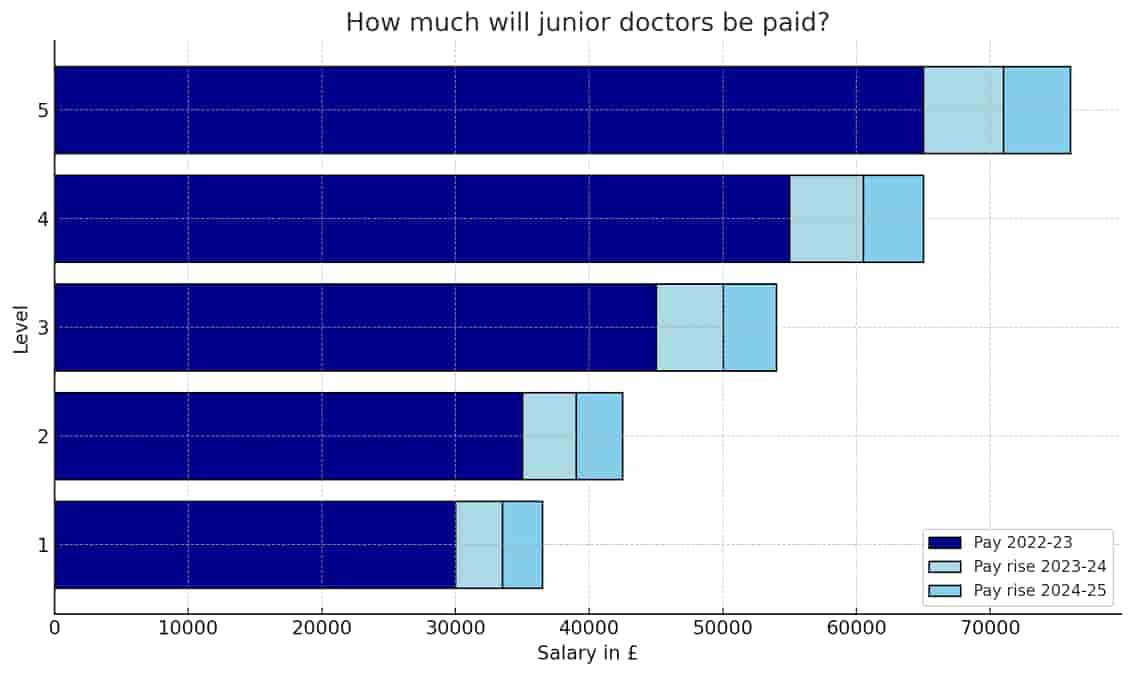Junior doctors in England have officially accepted a government offer of a 22% pay rise over two years, bringing an end to an 18-month-long dispute that involved 11 separate strikes. The British Medical Association (BMA), which led the junior doctors’ campaign for fairer pay, confirmed that 66% of its members voted in favour of the deal, with nearly 46,000 taking part in the online ballot.
The resolution comes after months of tension and significant disruption to NHS healthcare services, with the industrial action costing taxpayers an estimated £1.7 billion between 2023 and 2024. The BMA had originally pushed for a 35% pay rise, arguing that years of below-inflation pay increases had severely eroded the earnings of junior doctors, leaving them significantly underpaid compared to their counterparts in 2008.
The pay deal, proposed by Health Secretary Wes Streeting in July, offers a 4% backdated pay rise for the current financial year of 2023-24, in addition to a previous increase that brought the total rise for that period to an average of 9%. For the 2024-25 financial year, junior doctors will receive an 8% pay increase, as recommended by an independent pay review body. This cumulative increase brings the total pay rise to 22% over the two years, with the lowest-paid doctors set to benefit the most.
BMA Response and Future Expectations
While the agreement marks a significant milestone, leaders within the BMA have expressed cautious optimism about the deal. Dr Robert Laurenson and Dr Vivek Trivedi, co-chairs of the British Medical Association, described the offer as a “modest” above-inflation increase, highlighting that it still leaves junior doctor pay below 2008 levels.
Laurenson and Trivedi emphasised that while the acceptance of this deal is a positive step forward, the campaign for fair pay is not over. They warned the government that expectations for future pay increases remain high, stating that “if pay rises do not continue to outpace inflation, there will be “consequences.”
“We thank all doctors who have seen us through to this point by standing on picket lines and fighting for their worth,” the BMA leaders said. “The campaign is not over, but we, and they, can be proud of how far we have come.”
NHS Reaction and Relief
The resolution of the dispute has been welcomed by NHS leaders, who have faced significant pressure due to the strikes, which exacerbated already-strained hospital resources. Danny Mortimer, chief executive of NHS Employers, expressed relief at the outcome, stating, “Health leaders will breathe a massive sigh of relief to know that the dispute has come to a successful resolution.”
Mortimer highlighted the concerns over the winter period, which is expected to be challenging for healthcare services. “The last thing our members wanted was the threat of more strikes over what is expected to be a very difficult winter,” he added.
Broader Impact Across the UK
While the junior doctors’ dispute has been resolved in England, the situation varies across the rest of the UK. Junior doctors in Wales recently voted to accept an improved pay deal, while in Northern Ireland, negotiations are ongoing, though no industrial action is currently planned. In Scotland, junior doctors did not strike after accepting a pay offer from the devolved government last year.
Junior Doctor Title to Be Dropped
Alongside the pay deal, another significant change will take place: the title “junior doctor” will be dropped in favour of “resident doctor,” a move that has been long-advocated by the BMA. The term “junior doctor” has been criticised for failing to reflect the experience and qualifications of many doctors in this role, some of whom have more than eight years of experience in the profession.
Health Secretary Wes Streeting, who played a pivotal role in negotiating the pay deal, agreed to the title change during the talks, which will come into effect from Wednesday. Streeting described the acceptance of the deal as a “necessary first step” in reforming the NHS and reducing the strain on waiting lists. He commented: “This marks the necessary first step in our mission to cut waiting lists, reform the broken health service, and make it fit for the future.”
The Workers Union Says…
“The acceptance of the pay deal is a significant step forward in addressing the concerns of junior doctors and reducing the strain on the NHS. However, both the BMA and healthcare leaders acknowledge that more work is needed to ensure fair pay and prevent future disputes. As the NHS faces a challenging winter ahead, the end of the strikes offers some respite, but the ongoing demands for further pay increases suggest that this issue is far from fully resolved.”




